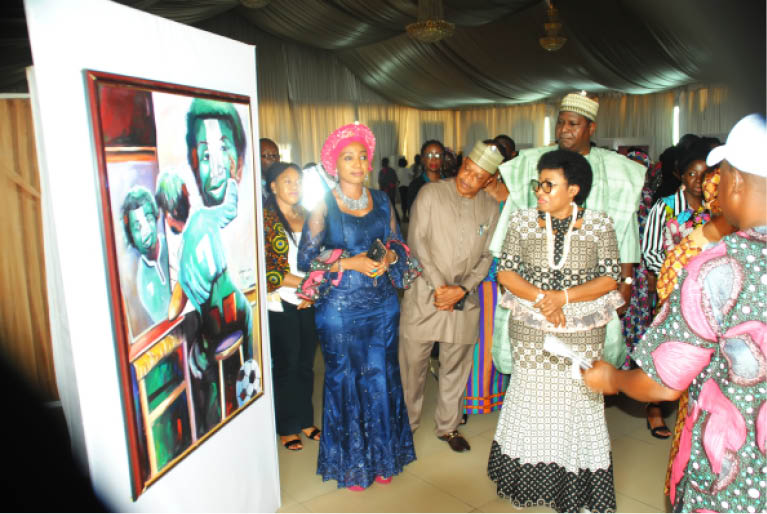Exhibition empowers women for governance
A two-day art exhibition, organized by the Educational Services Department of National Gallery of Art (NGA) has urged government to create an enabling environment for economic and political empowerment of women. The event which held on February 1 and 2, was themed, ‘No Woman Left Behind: Nigerian Women Bridging the Gap in Governance and Politics.’ […]

The Perm Sec. Min of Information and Culture, Grace Gekpe touring the exhibition
A two-day art exhibition, organized by the Educational Services Department of National Gallery of Art (NGA) has urged government to create an enabling environment for economic and political empowerment of women.
The event which held on February 1 and 2, was themed, ‘No Woman Left Behind: Nigerian Women Bridging the Gap in Governance and Politics.’ It was tailored at the socio-economic empowerment of Women in Visual Arts (WIVA) sector.
Evelyn Ikuenobe-Otaigbe, Director, Educational Services, of the agency and WIVA initiator said the programme is an empowerment and enlightenment platform for women in visual arts to be part of current issues in governance.
The Minister of Information and Culture, Alhaji Lai Mohammed, was represented by the Permanent Secretary in the Ministry, Grace Kepke, who encouraged women to take be keener about governance and politics.
Mrs. Osaretin Demuren, Chairman, Guarantee Trust Bank (GTB), in her address, ‘No Woman Left Behind: Nigerian Women Bridging the Gap in Governance and Politics,’ said that as another general election, is here, there is need for leaders to remember the Late Nelson Mandela’s statement that “Freedom cannot be achieved unless the women have been emancipated from all forms of oppression.”
Describing factors militating against women’s participation in governance, as institutional, historical, socio-economic and cultural factor, she said, “Traditionally, women were raised to focus on homemaking, supporting their husbands and rearing children. In that capacity, the formal education of girls was deemed to be of less consequence.
“Basic literacy and numeracy were only important for training the children. Also, the woman’s other goal was to support her husband and assist in building his career and eventual success, thus the saying ‘behind every successful man there is a woman’.
“These activities and responsibilities deter her from focusing on her development and education as well.”
She expressed worries that politically, it has been difficult for women to break the glass ceiling.
Adding that, “In terms of appointments, each government has tried to increase the number of female representations in its cabinet whilst in terms of elective positions; the number of women has continued to decrease.
“We have never achieved up to 10 per cent in number of women representatives in the National Assembly.
“My charge today is for us to know that it is important we participate in governance and politics.
Professor Mabel I. E. Evwierhoma, Director, Diaspora Centre, University of Abuja, in her presentation, said a major development index affecting women in the 21st century is the political gap separating women from their goals and aspiration in politics.
She said, “The current democratic space in Nigeria can do well without the gaps that hemline women and constantly threaten to push them back to the fringes of politics and governance despite their indomitable efforts in and contribution to governance.
“Our attention on women, politics and governance, is a highly welcome one. The notion that women have nothing to do with politics and governance is no longer accepted.”
Evwierhoma emphasized that access to education and economic power are equally necessary to bridge the space between women and political activity.
She said factors that have continued to thwart women’s quest for political parity include tradition and culture, gender inequality arising from sex profiling or stereotypes, feminization of poverty as well as nature versus nature.
These are in addition to spousal influence, vacuum in leadership, identity politics, low self-worth and patriarchy.
The highlight of the event was the unveiling of the exhibition by the women led by the Permanent Secretary, Gekpe.
Guests were also threated to a drama presentation by the staff of Educational Services Department titled, ‘Hatched.’
The piece written by Otaigbe, portrayed women coming together from the six geo-political zones of the country and while focusing on the birth of a new Nigeria by six different mothers representing the six geo political zones of Nigeria.
The drama was a summary of hurdles women face in every aspect of their lives as the women jointly rejected all forms of impunities like nepotism, tribalism, inequality, injustice and other social vices and in turn, entrenched dignity, accountability, justice, federal character, religious tolerance and peaceful co-existence.
Works displayed showed women’s long and historic participation in governance.
